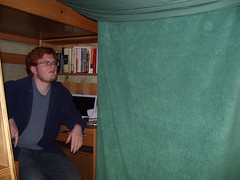So, I finally saw it. I probably could have used my time better, but there’s no use crying over spilt milk. I knew people were generally disappointed with it, but I figured I might as well finish off the trilogy. After all, I watched Spiderman 3 and was pleasantly surprised by it (despite half a dozen friends telling me how much they hated it in advance).
This was no Spiderman 3. I remember seeing the first movie, The Curse of the Black Pearl, and being charmed by its humor. I even remember glimpses of that same charm in the second installment, Dead Man’s Chest. I didn’t love it in the same way, and yet I was certainly entertained. After all, at least they had Captain Jack Sparrow. This one, however, dragged on forever. I glanced at the clock after each flat, pathetic attempt at a joke, and there were many.
I know the exact moment I lost all respect for the movie. The leaders of the two opposing sides meet for a parley, and an uncharacteristic, sort of rock n’ roll soundtrack kicks in as the camera follows the good guys’ purposeful strides towards their waiting enemies. Proactive meets stagnant, rebel-with-a-cause meets bureaucrat. The stage is set, camera swings to the enemy—and Davy Jones is standing in a large bucket of seawater. A joke? Probably. One I was receptive to? No. It wasn’t good comedic timing, and it spelled out the word cheesy in neon letters.
But that wasn’t the worst moment. No, that was scheduled for ten minutes later, when Will Turner and Elizabeth Swann decide to get married during a battle. Oh, but they don’t just decide to get married—they get married right then and there by the power vested in Captain Barbossa, as they slash and stab away at the combined forces of the East India Trading Co. and Davy Jones.
And now I’m about to ruin the whole ending, right down to the nub, so if you have a misguided desire to watch it yourself, stop reading here.
When Will becomes the new captain of The Flying Dutchman, I was momentarily touched by Jack Sparrow’s sacrifice of immortal life for the sake of a friend. However, I was soon thoroughly disturbed by the denouement. Basically, Will gets one day ashore for every ten years he spends ferrying the souls of those who die at sea. And he asks Elizabeth to wait for him, to literally keep his heart safe, while he is away at sea. I don’t wish to sound overly noble, but I think I would have the decency to wish for consistent happiness for my true love, not just a tryst once every ten years. Let her be free and find some guy who can make her happy at least two days in every 3650. But I guess I shouldn’t lecture, since I clearly haven’t experienced such earth-shattering love in my life.
Finally, and this is a tiny thing, I don’t get what’s with the crabs who carry the Black Pearl from the middle of a desert to the sea. It is never explained as more than a ridiculous fluke, some sort of stupendous serendipity, but it really didn’t make any sense.
So, it kind of stinks. The only plot device the writers seem capable of employing is the double-cross, and so many people escape from “brigs” that I question their usefulness at all. The first hour is tedious, the second absurd, and the last half-hour merely pitiful. In other words, if you have miraculously escaped it this long, continue evading it as long as humanly possible.
I much prefer to remember the Jack Sparrow of the first movie, not the shadow he became in the third. I mean the Jack Sparrow who rode into my heart on the mast of a sinking boat, stepping lightly onto the quay of my affection. That is Captain Jack Sparrow. Not this.
Sincerely,
Spencer Miles Kimball

